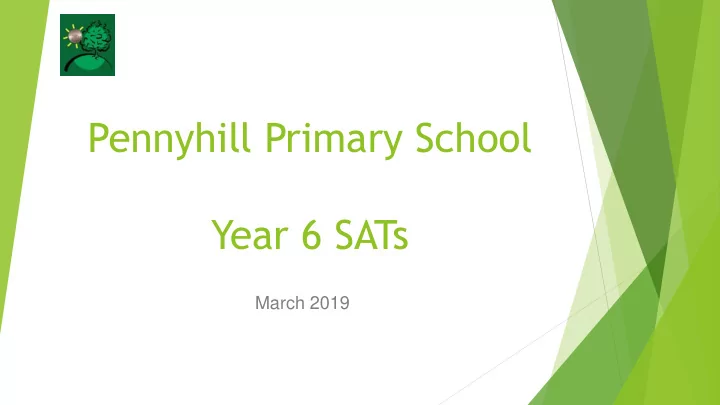

Pennyhill Primary School Year 6 SATs March 2019
Welcome from the team 6E Mrs Morgan 6R Mr Treadwell 6A Mrs Lawrence & Mr Morgan Mrs Agger Mrs Clarke Mrs Newell Mrs Hodgetts Miss Cash
Why does my child need to take SATs? • To hold schools accountable for the achievement of their pupils • To publish results in league tables so that parents are aware of standards To inform parents of children’s attainment and progress • To inform Secondary schools of children’s attainment. • To enable Secondary Schools to set targets and future exam predictions •
What tests will my child do? At the end of Year 6, children sit tests in: • Reading • Maths • Spelling, punctuation and grammar These tests are both set and marked externally.
Why isn’t there a writing test? • Writing judgements are based on teacher assessment only. But may be moderated by local authority representatives. • Throughout the year we have been, and will continue to, assess the children’s writing. • Writing across other subjects such as Science and Topic is also used to inform our judgements. This continues until the end of the year. •
Reading The reading test is a single paper with questions based on three passages of text. Your child will have one hour, including reading time, to complete the test. There will be a selection of question types, including: Ranking/ordering , e.g. ‘Number the events below to show the order in which they happen in the story’ Labelling , e.g. ‘Label the text to show the title of the story’ Find and copy , e.g. ‘Find and copy one word that suggests what the weather is like in the story’ Short constructed response , e.g. ‘What does the bear eat?’ Open-ended response , e.g. ‘Look at the sentence that begins Once upon a time . How does the writer increase the tension throughout this paragraph? Explain fully, referring to the text in your answer.’
Example Reading Questions
Grammar, Punctuation and Spelling Tests The grammar, punctuation and spelling test consists of two parts: a grammar and punctuation paper requiring short answers, lasting 45 minutes, and a spelling test of 20 words read out by the class teacher , lasting around 15 minutes. The grammar and punctuation test will include two sub-types of questions: Selected response , e.g. ‘Identify the adjectives in the sentence below’ Constructed response , e.g. ‘Correct/complete/rewrite the sentence below,’ or, ‘The sentence below has an apostrophe missing. Explain why it needs an apostrophe.’
Example GPS Questions
Maths Children sit three papers in maths: Paper 1: arithmetic , 30 minutes Papers 2 and 3: reasoning , 40 minutes per paper Paper 1 will consist of fixed response questions, where children have to give the correct answer to calculations, including long multiplication and division. Papers 2 and 3 will involve a number of question types, including: Multiple choice • True or false • Constrained questions, e.g. giving the answer to a calculation, drawing a • shape or completing a table or chart Less constrained questions, where children will have to explain their • approach for solving a problem
Example Maths Questions
Science Not all children in Year 6 will take science SATs . However, a number of schools will be required to take part in science sampling: a test administered to a selected sample of children thought to be representative of the population as a whole. For those who are selected, there will be three papers: Biology : 25 minutes, 22 marks • Chemistry : 25 minutes, 22 marks • Physics : 25 minutes, 22 marks •
When will the SATs take place? Th The e Year ear 6 KS2 S2 SATs wi will l be be adm admin inis istered in n the the th Ma g 13 th wee eek com ommencin ing May 2019. 2019. Mond Monday 13 Ma May 2019 Spelling, Punctuation & Grammar - Paper 1 Spelling, Punctuation & Grammar - Paper 2 Tuesd uesday 14 May 2019 English Reading Wedn dnesd sday 15 Ma May 2019 Maths Paper 1 (Arithmetic) Maths Paper 2 (Reasoning) Thur Thursd sday 16 Ma May 2019 Maths Paper 3 (Reasoning)
How do I know what my child has achieved? National curriculum levels have now been removed, instead children are given scaled scores. You will be given your child’s raw score (the actual number of marks they get), alongside their scaled score and whether they have reached the expected standard set by the Department for Education The range of scaled scores available for each KS2 test is: 80 (the lowest scaled score that can be awarded) 120 (the highest scaled score) The expected standard for each test is a scaled score of 100 or more. If a child is awarded a scaled score of 99 or less they would not have achieved the expected standard in the test.
Supporting your child at home Homework – set on Friday to be returned by Wednesday My Maths – Rock star times table will give the children additional practise Bug Club exposes the children to a wide range of sophisticated vocabulary and develop their understanding of different reading materials. Reading comprehension develops the children analytical skill to interpret the text and answer comprehension questions. Talking …
Supporting your child during SATs Week May 2019 Please make sure that They are well rested Eat a healthy breakfast; we will be running a breakfast club for Year 6 children. Drink plenty of water You don’t put any additional pressure on them Encourage them to ask the adult in the room if they would like something read to them during the tests Explain that the tests are a way of showing what they know, and are not there to catch them out.
Recommend
More recommend